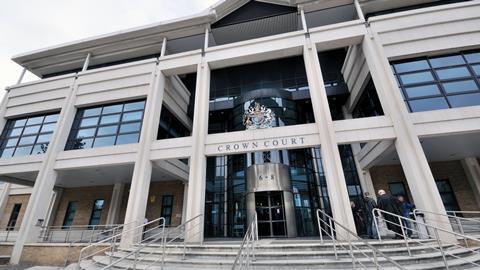I had the rare opportunity this month to spend the day at Kingston (upon Thames, not Hull) Crown Court. After smoothly passing through security (I deliberately chose an outfit that didn’t require a belt that needed to be taken off and didn’t bring any sharpened pencils lest security deem them a weapon), I headed up to the first floor, where the list office confirmed that the trial I thought I would be covering for the next two weeks was adjourned until June 2023.
After a quick call to my news editor, who said I could hang out in court all day, I checked the court lists, noticing court 3 had a jam-packed schedule.
With about 20 minutes to spare, I browsed the posters on the walls of the ground floor corridor, including the one of delicious looking meals to promote the café on the third floor. Today’s menu: baked potato with chilli con carne, tuna mayo or baked beans. Lunch sorted.
I headed into court 3, introducing myself to an incredibly friendly usher who directed me towards the public gallery and asked me to make sure my mobile phone was switched off (it was).
The first case was listed for 10am. There was just one problem – the defence solicitor was in another courtroom for a sentencing case.
After a 20-minute wait (working out the words scratched into the walls of the public gallery kept me occupied), the second case began – a straightforward ‘for mention’ hearing. Prosecution and defence counsel appeared remotely on the two large TV screens in the court.
Most of the cases were straightforward and dealt with quickly. Did I know what each case was about? No. What I was witnessing was what was required at that particular moment to progress the case, whether it be a pre-sentence report, or the need to remove the case from the current warned list because one of the psychiatrists was unavailable.
In one case, the court heard that the defendant needed to be reminded of his disclosure obligations. The case was adjourned so the defendant could be produced and his solicitor could try and obtain instructions.
In another case, where a witness summons was required, the court heard that seven years had passed since the alleged incident. The case was listed for trial in the summer but adjourned due to the criminal bar’s action over legal aid funding.

Before I knew it, it was lunchtime. I headed to the third floor to check out the court café. The room was packed. There was a section for court staff only. As I waited in line and looked around the room, I wondered who I would end up asking if it was OK to sit at their table. Were they counsel, defendant, witness, a family member? In the end, I managed to get a table to myself, where I tucked into the most expensive jacket potato I’ve ever bought. Chilli con carne and butter, £8 – but delicious.
Shortly before 2pm, I headed back to court 3.
An interesting, albeit sad, case to begin the afternoon session. The court heard that the matter was in the warned list. A trial was set for later in the year, but the defendant was dead. Defence, appearing remotely, explained that an officer had attempted to obtain a final death certificate from the Home Office, but for reasons unexplained, the Home Office was unable to provide one. The coroners’ court had confirmed the defendant was deceased. The judge was satisfied on the evidence available to him that the defendant had passed away. The indictment had no legal effect. File closed.
A couple more straightforward cases dealt with quickly. The final case - listed for mention but was actually for sentence - should have started at 2.30pm but began nearly 45 minutes later than scheduled as the prosecutor was in another case that had overrun.
The defendant’s partner was in the row behind me and was allowed to briefly say hello to her partner who, the court later heard, had spent 351 days on curfew and 671 days remanded in custody. His defence barrister told the court that those who had been in custody during Covid may have suffered more than those who had been in custody before or after the pandemic. The defendant was used to seeing his family. including his grandchild, on a daily basis. Once he was remanded in custody, in early 2021, he could not have any visits for eight months. Exercise was not daily. Showers were limited. The defendant wrote a letter to the judge, which he quietly read.
Bearing in mind the time the defendant spent on curfew and in custody, the judge said the sentencing decision he had made should result in his release. The defendant, who I could not see from the public gallery, sounded happy: ‘Thank you very much. Merry Christmas.'





































6 Readers' comments